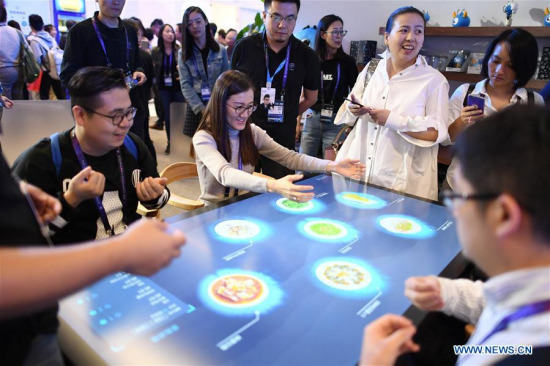
Visitors try self-ordering service at a "restaurant of the future" booth on "The Computing Conference 2017" in Hangzhou, capital of east China's Zhejiang Province, Oct. 11, 2017. The four-day conference kicked off here on Wednesday, attracting guests from 67 countries and regions. (Xinhua/Huang Zongzhi)
In an automated restaurant, with human-computer interaction, visitors can complete ordering and online payment, saving time for the customer and reducing employment costs for the restaurant.
That's a scene displayed at the Computing Conference 2017, held in east China's Hangzhou City and hosted by Alibaba Group, a Chinese e-commerce giant.
The conference aims to give people a chance to experience the real world uses of cutting-edge technology.
Besides the futuristic restaurant, new technologies have also been applied in other experiential scenes, such as healthcare, travel and accommodation.
Vending machines at the conference don't need coins or mobile payment. By simply standing in front of the machine, the customer's face is recognized in seconds, and the bottle comes out immediately.
"More and more technology is being integrated into our daily lives in these exhibits. Previously, such advanced tech was meant for use in the scientific and financial industries," said Wang Congmao, who attended the conference and interacted with the exhibits.
A woman, who gave her name as Wang, said it was incredible that she could be told her capacity to drink alcohol at the conference. Using a cotton swab to collect cells in her mouth, Wang did the DNA collection herself. Just an hour and a half later, she received the results on her phone, telling her how much she could safely drink.
A total of 450 scientific and technological enterprises have displayed their most advanced technologies since the conference started Wednesday in the city, which is also the home to the Alibaba Group headquarters.
"This is the most comprehensive technological exhibition I've ever seen. The technologies have been applied to various aspects of daily life. I can feel how those tiny yet beautiful changes will affect my life in the future," a visitor told Xinhua.
New technology at the conference is not just there as a novelty for customers. Businesses can use it to transform their operations.
A network security company can produce an examination report on a website in just half an hour. All that is needed is the website address, or URL.
John Troughton, globalization consultant for the UAV (Unmanned Aerial Vehicle) company XAIRCRAFT, attended the conference on Wednesday. "China's internet technology, Cloud computing and AI have benefitted more and more people, bringing huge changes in the world as well. The Computing Conference is a platform, which not only showcases China's cutting-edge technologies, but also shows how those technologies can be widely used in our daily lives," he said.
Wang Jian, Chairman of Technology Steering Committee of Alibaba Group, introduced one of the highlights of the conference. Hangzhou City Brain, launched in beta mode one year ago, can optimize traffic light time allocations via data analysis. Travel for the 9-million residents in Hangzhou would be optimized by the new system.
"There are 128 traffic lights in Hangzhou being controlled by the City Brain. The Brain can report traffic jams, parking which violates traffic rules and road accidents. It reports more than 500 times daily with a 92 percent accuracy," said Ye Hanbing, director of Public Security Bureau of Hangzhou.
The Brain can also manipulate lights to facilitate the operation of ambulances, Ye added.
So far, several cities have started trials of this system. The performances of those systems will be published in the coming months.
Science and technology are the keywords of the computing conference this year. A Chinese Academy of Sciences (CAS) research institute and Aliyun, Alibaba's Cloud computing subsidiary, released a Cloud platform for quantum computing on Wednesday. The platform will offer users a development and testing environment for cloud-based quantum algorithms.
Alibaba Group also announced it will invest over 100 billion yuan (about 15 billion U.S. dollars) over the next three years in advanced technology development.
The ongoing conference will last until Saturday when it will move around the country to Guangdong, Suzhou and Beijing by the end of the year.


















































